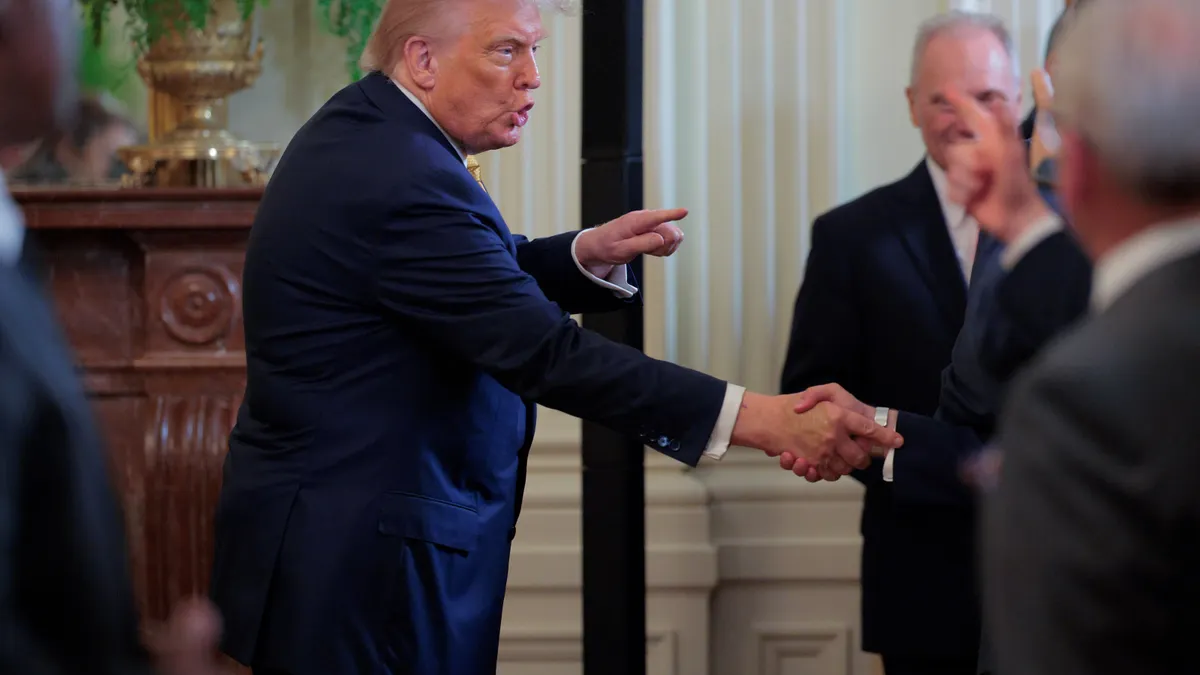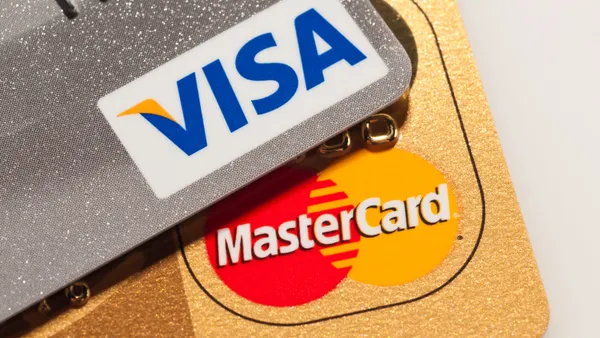Dive Brief:
- Financial technology firms and merchants asked President Donald Trump to intervene with the Consumer Financial Protection Bureau to support their position in a court battle with large banks over the fate of a U.S. open banking rule.
- Ten trade associations sent Trump a letter Wednesday appealing directly to his America-focused agenda in keeping the U.S. a global leader in financial services. The fintechs want Trump to direct the bureau “to ask the court to affirm that consumers, not big banks, control their financial data and have the right to access and share it with companies of their choice at no cost.”
- The letter came the week before the CFPB has a court deadline of July 29 to respond to a filing by the Financial Technology Association, which has intervened in the litigation to defend the open banking rule.
Dive Insight:
Under Acting Director Russell Vought, the CFPB has adopted the banks’ position that the rule is unlawful and has asked a federal judge overseeing bank groups’ lawsuit in Kentucky to grant summary judgment against the rule.
The fintechs’ letter to Trump landed the same month that the largest U.S. bank, JPMorgan Chase, rolled out new access fees for aggregator firms that request customer financial data. Those charges are set to begin in September for some firms.
The letter was sent five days after Trump signed the Genius Act into law Friday, offering a regulatory framework for stablecoins, amidst a backdrop of potential higher fees for financial transactions. On Monday, Trump’s social media company announced a $2 billion purchase of digital currencies.
In their letter, the fintech associations argue that the large banks are “exploiting regulatory uncertainty” at a time when the open banking rule is mired in litigation.
“These large, incumbent banks are taking aggressive action to unwind the recent progress achieved under your Administration by moving to charge exorbitant fees for access to fintech and crypto apps,” the letter said. “These actions risk debanking Americans from the financial services of the future, all to protect big banks’ competitive advantage.”
The banks’ efforts to protect market share undermines Trump’s agenda, according to the letter, and “risks the future of fintech, digital assets, and America’s financial innovation and global leadership.”
The letter also reminds Trump that the bureau’s open banking rule was begun during his first term in office.
The CFPB adopted the rule in October under the Biden administration. It is set to take effect for the largest banks in mid-2026, with compliance deadlines for other banks layered through 2030. Financial institutions with less than $850 million in assets are exempt from the rule.
The Bank Policy Institute, the Kentucky Bankers Association and Forcht Bank sued last year to block the rule, arguing that the agency had exceeded its authority, and challenged several aspects of the open banking rule.
Phil Goldfeder, CEO of the American Fintech Council, one of the groups that signed the letter, said Wednesday that U.S. open banking faces “a pivotal moment.”
“We’re asking the administration to reaffirm its commitment to American consumers who should have the ability to control their own financial data,” Goldfeder said in an email. “This is a moment where the administration can and should lead.”
So far, no other banks have followed JPMorgan’s lead on data fees, but PNC Financial Services Group is “in discussions on it,” PNC Chief Executive Bill Demchak said July 16 on the bank’s quarterly earnings call.
“I applaud what JP did — I think they’re exactly right,” Demchak said. “I think there’s a big cost to keeping this data secure and producing it in a form that’s readable for our clients. So we’re thinking about it.”
On Tuesday, Donald Trump Jr., offered support on his X account to a comment by venture investor Tyler Winklevoss highlighting a news article about the JPMorgan access fees. “JPMorgan and the banksters are trying to kill fintech and crypto companies,” Winklevoss wrote.
The letter to Trump was signed by the Financial Technology Association; the American Fintech Council; the Blockchain Association; the Chamber of Progress; Crypto Council for Innovation; The Digital Chamber; the Financial Data and Technology Association; the National Association of Convenience Stores; the National Restaurant Association; and the National Retail Federation.













